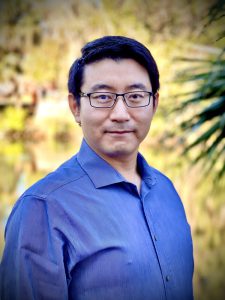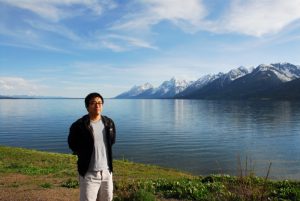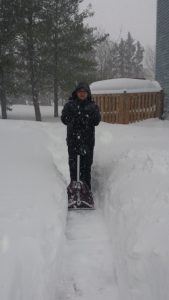 In this installment of our Discover FSHN Series, we are pleased to welcome Dr. Boce Zhang. Dr. Zhang is an assistant professor of food microbiology in the Food Science and Human Nutrition Department at UF. His multi-disciplinary research aims to uncover the mechanisms of pathogen resistance and may be vital for developing ways to lessen food safety risks in our food system. Read on to learn about his journey from chemistry to food microbiology, his most recent projects, and his strongest food-related memory.
In this installment of our Discover FSHN Series, we are pleased to welcome Dr. Boce Zhang. Dr. Zhang is an assistant professor of food microbiology in the Food Science and Human Nutrition Department at UF. His multi-disciplinary research aims to uncover the mechanisms of pathogen resistance and may be vital for developing ways to lessen food safety risks in our food system. Read on to learn about his journey from chemistry to food microbiology, his most recent projects, and his strongest food-related memory.
Tell me about how you became interested in food safety and food microbiology.
When I started graduate school at the University of Maryland in 2008, I was transitioning from my undergraduate major in chemistry to different areas for my graduate training. I wanted to work on significant problems for humanity with more practical values and profound implications. Food microbiology and food safety became those ideal topics for me—topics in which I developed strong passions throughout my Ph.D. years at UMD.
After graduation, I started my postdoctoral training at the USDA-ARS in 2013. It was the dawn of the 2011 Food Safety Modernization Act (FSMA), the most extensive food safety reform in the US for over 70 years. I had some invaluable opportunities to sit in the front row to witness and participate in science-based policy development. Retrospectively speaking, those were the most important three years of my career when I started to work on some of the most crucial problems in our food systems.
In 2016, I became an assistant professor in biomedical and nutritional sciences at the University of Massachusetts, Lowell. I developed my lab and an independent research program, and I established some fantastic collaborations in the Boston area. I moved to the University of Florida in January 2022, and it is certainly very exciting for me to join this prestigious department and have the opportunity to work with my colleagues on some of the most critical food and nutrition problems.

Would you share some of the recent projects you are working on?
My lab integrates microbial omics, machine learning, nanotechnology, and biointerface science to work on broad aspects of food microbiology, including fundamental science, surveillance, and mitigation. One of my interests focuses on elucidating the mechanisms of pathogen persistence in our food systems, including bacterial evolution, adaption, biofouling & biofilm, and antimicrobial resistance.
Currently, we are working on a multi-year revelatory project to understand how and why bacteria attach to and colonize basically all food and food contact surfaces. I believe this knowledge is critical in our quests to provide better science-based surveillance and mitigation strategies for a safer and more resilient food supply chain. Last year, we started an exciting spin-off project examining bacterial behaviors under micro- or partial gravity (like on the Moon and Mars). It is also my lab’s aspiration to pay our fair share of contributions to the future of humanity as a multi-planetary species.
What are some of your other current projects?
One critical methodology in our inquisitions utilizes Nanopore DNA/RNA sequencing for state-of-the-art genomics and transcriptomics capacities. We also develop and validate new Nanopore sequencing and bioinformatics pipelines for portable and point-of-use environmental surveillance of foodborne pathogens.

Another major technical platform developed in-house is our machine learning-enabled smart packaging, which monitors perishable food. The ‘smart’ element is a sensor array engineered to ‘smell’ potential foodborne pathogens and food spoilage within packaged food. We have been developing this platform for over five years now, and it has shown early promises.
If successful, smart packaging can empower regular consumers with the knowledge to avoid compromised food and prevent food poisoning. It can also provide the industry with the capabilities to monitor its supply chain and prioritize its distribution and sales logistics. Finally, smart packaging would have profound implications on food and supply chain security by reducing food waste and loss.
What classes do you teach?
I teach FOS.6226C Advanced Food Microbiology during the spring semesters. This is a graduate-level course with integrated lectures and labs. The course is designed to provide an advanced understanding of contemporary and emerging concepts and issues in food microbiology. Focus is placed on linking pathogens with relevant reservoirs and understanding basic mechanisms that microorganisms use to survive mitigation strategies in food production, distribution, and consumption.
Food science is fun and exciting […] At the same time, it is a rigorous and complex science with challenging problems and profound impacts on society.
I am also developing a new course on food biotechnology, which would be a combined undergraduate/graduate course. I plan to include four modules of concepts and topics, including AI, omics, genome-editing, and nano-bioscience of food materials/ingredients. These are cutting-edge developments in food science, and some have had tremendous business growth and successes in the food industry. I hope the new course could help expand the horizons of our students and prepare them for broader career awareness and opportunities.

What do you believe are the most important facts the public should know about food science?
I think there are misconceptions about food and nutritional sciences by the public, and sometimes by the scientific community. Food science is fun and exciting, especially if you aspire to be a chef or a brewmaster. At the same time, it is a rigorous and complex science with challenging problems and profound impacts on society. As an example, food microbiology touches on every aspect of the food and food supply. No one wants to see food transmit pathogens and antimicrobial resistance in a supply chain that is unprecedentedly inter-connected and globalized.
Nonetheless, this is the reality we all live in, especially when ~70% of all medically important antimicrobials are used in food production. It takes the One Health philosophy and system science to address this problem. Food scientists are essential in this uphill battle against nature and its fierce force of natural selection.
On the other hand, food microbiology doesn’t have to be so gloomy. Microbes also play a vital role in the success of food security and our fight against hunger and famine. Knowledge in food microbiology can help us engineer the microbiome to increase crop yield and climate resilience, and it can also reveal opportunities to slow down, or even stop, food spoilage and food loss. Food microbiology can also be cutting-edge in the dawn of a new era of space exploration, as astromicrobiology will be the key to the future of space food production, which has the uttermost standards for nutrition, safety, and sustainability.
What do you like to do in your free time?
I read books and listen to podcasts on a broad range of topics. I also like to travel with my family, but it will take time before we return to our pre-pandemic level of travel. A fun fact is that I just started to learn chess with my kid this year. Now I am astounded knowing Google’s AlphaZero can learn chess and defeat human grandmasters within four hours, and that was five years ago.

What is one of your most interesting food-related memories?
After I came to the US for my Ph.D, I noticed the pizza looked and tasted totally different from the ones I had before. The pepper and garlic sauce was also quite interesting for a first-timer, to say the least. But I like it now.
Interested in learning more about FSHN’s Food Science programs? Read more here and here and here!
P.S. The Discover FSHN Series highlights the unique experiences of UF’s Food Science and Human Nutrition students, faculty, staff, and alumni. Want to read more about the amazing work going on in the FSHN department? See our previous features below (click on arrows to expand):
Undergraduate Students:
Shannon Mai, Dietetics
Alex Colon, Dietetics and Jenny Duong, Food Science
Jackie Shannon, Nutritional Sciences
Jennifer Jordan, Food Science
Lily Tucciarone, Dietetics
Tim Cassella, Nutritional Sciences
Graduate Students:
Savanna Curtis, Food Science (M.S.)
Carley Rusch and Matthew Beke, Nutritional Sciences (Ph.D.)
Alexa Hosey, Dietetics (MS/DI)
Vicnie Leandre, Food Science (M.S.)
Rufus Theophilus, Nutritional Sciences (Ph.D.)
Amber Fritsche, Dietetics (MS/DI)
Amy Jones, Food Science (Ph.D.)
Melissa Perez Santana, Food Science (M.S.)
Postdoctoral Associates:
Dr. Cameron Bardsley, Food Safety
Dr. Tautvydas Shuipys, Food Safety
Dr. Felix Jimenez Rondan, Nutritional Sciences
Faculty:
Dr. Naim Montazeri, Food Science/Food Virology
Dr. Jeanette Andrade, Dietetics
Dr. Zhiyong Cheng, Nutritional Sciences
Dr. Juan Andrade Laborde, Global Nutrition
Dr. Razieh Farzad, Food Science
Dr. Beth Gankofskie, Dietetics
Dr. Anne Mathews, Nutritional Sciences
Dr. Diana Taft, Nutritional Sciences
Staff:
Sharyn Passeretti, Lab Specialist
Herschel Johnson, Manager of Student Services
Brandy Johnson, Administrative Assistant
Kohrine Counts Hazim, Dietetics Program Coordinator
Alumni:
Dr. Rebecca Gould, Dietetics, Postdoctoral Research
Dr. Becca Solch, Nutritional Sciences, Postdoctoral Research
Hannah Cooper, Dietetics, Private Practice
Dr. Richie Li, Food Science, Product Development
Doctor Brian Barrow, Nutritional Sciences, Medicine/Physician
Luciano Junoy, Food Science, Product Development
Carlin Dixon, Dietetics and Professional Dance
P.P.S. Learn more about FSHN’s renowned programs below!
Undergraduate Programs:
Dietetics
Food Science
Nutritional Sciences
Graduate Programs:
M.S. Dietetic Internship Program
M.S. Food Science and Human Nutrition
Ph.D. Food Science
Ph.D. Nutritional Sciences

 20
20